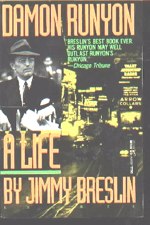Damon Runyon
A brilliantly-written, charismatic chronicle of the chronicler of Broadway, written by one of the last men to fill Runyon’s shoes as a New York sportswriter. Runyon was a queer fish. He didn’t drink, but liked nothing better than to spend the night in a bar. He didn’t much like star athletes, and became the characteristic voice of what was remembered as a golden age because he wrote about it. He wrote skeptically of guys and dolls, and fell himself for a young Mexican dancer who was, he convinced himself (if not anyone else) really a Spanish countess. As Adam Gopnick observed earlier this year, Runyon was a gentile who spent most of his time with nice Jewish boys who happened to be gangsters. His take on this book is not charitable:
The best book about Runyon is Jimmy Breslin’s slightly dispiriting biography, published in 1991, one of those “matches” that make a publisher feel wonderful until the manuscript comes in. Writers train for one length or another, and Breslin’s is essentially a series of eight-hundred-word columns strung together, all told in that good Breslin style, where this guy said that to this other guy—quick glimpses of Prohibition, the Hearst press, stealing coats in the Depression—so that the total effect is like watching the world’s longest subway train go by at night.
And he is not wrong, though perhaps that longest subway train is a slight exaggeration. But Breslin has a nose for the story, and Breslin’s big story — the transition from Prohibition Manhattan, where friction was about money and religion, to 1960 New York, where everything was about race – fits nicely with Runyon’s, and the opening segue, from the archives of the University of Texas to the old Hearst newsroom and a dingy Manhattan apartment filled with cops and reporters, is a thing of beauty.
